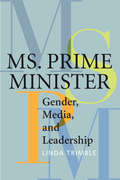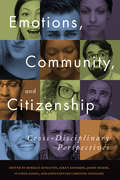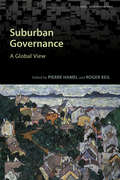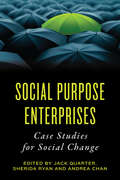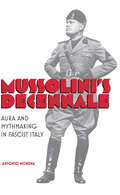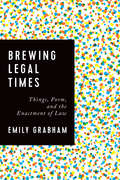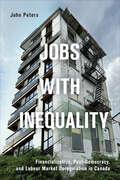- Table View
- List View
The Logic of Conformity
by Tomoko T. OkagakiIn The Logic of Conformity, Tomoko T. Okagaki examines Japan's entry into the European state system in the late nineteenth century. Okagaki focuses on the extraordinary degree of conformity that Japan demonstrated in accommodating itself to Western norms of international relations within a very short period of time. By introducing a political science perspective to the study of Japan's modernization, which has heretofore been studied mostly as a historical subject, she emphasizes the significance of contextual factors that constrained the ways in which Japan entered international society.As Okagaki shows, while the international system defined the mode of Japan's socialization in many ways, Japan's entry also symbolized a transformation of the international system from that of Euro-dominance to legal equality. A sophisticated and significant contribution to the literature on state building and the history of international relations, The Logic of Conformity is a fascinating study of how the concept of sovereignty is reshaped by the entrance of newcomers.
Steering from the Centre
by Jon Pierre Carl Dahlström B. Guy PetersGovernments face new challenges in an era marked by globalization, shifting economic and national security policies, pervasive electronic media, and policy reform. Steering from the Centre details how chief executives in ten Western democracies have responded to governance challenges in the wake of reform ideas such as the New Public Management which stress deregulation and decentralization.This volume analyzes the extent to which the centre of government can retain political and administrative control when delivery of public services is increasingly done through networks, contacts, partnerships, and a host of other devolved arrangements. International in scope, Steering from the Centre covers the experiences of diverse countries and examines how various centralization/decentralization strategies have played out in these differing national and institutional contexts.
Wrestling with Democracy
by Dennis PilonThough sharing broadly similar processes of economic and political development from the mid-to-late nineteenth century onward, western countries have diverged greatly in their choice of voting systems: most of Europe shifted to proportional voting around the First World War, while Anglo-American countries have stuck with relative majority or majority voting rules. Using a comparative historical approach, Wrestling with Democracy examines why voting systems have (or have not) changed in western industrialized countries over the past century.In this first single-volume study of voting system reform covering all western industrialized countries, Dennis Pilon reviews national efforts in this area over four timespans: the nineteenth century, the period around the First World War, the Cold War, and the 1990s. Pilon provocatively argues that voting system reform has been a part of larger struggles over defining democracy itself, highlighting previously overlooked episodes of reform and challenging widely held assumptions about institutional change.
Dominion of Capital
by Don NerbasIn the critical decades following the First World War, the Canadian political landscape was shifting in ways that significantly recast the relationship between big business and government. As public pressures changed the priorities of Canada's political parties, many of Canada's most powerful businessmen struggled to come to terms with a changing world that was less sympathetic to their ideas and interests than before. Dominion of Capital offers a new account of relations between government and business in Canada during a period of transition between the established expectations of the National Policy and the uncertain future of the twentieth century.Don Nerbas tells this fascinating story through close portraits of influential business and political figures of this period - including Howard P. Robinson, Charles Dunning, Sir Edward Beatty, R.S. McLaughlin, and C.D. Howe - that provide insight into how events in different sectors of the economy and regions of the country shaped the political outlook and strategies of the country's business elite. Drawing on business, political, social, and cultural history, Nerbas revises standard accounts of government-business relations in this period and sheds new light on the challenges facing big business in early twentieth-century Canada.
Governance in Northern Ontario
by Charles Conteh Bob SegsworthThis book analyzes economic development policy governance in northern Ontario over the past thirty years, with the goal of making practical policy recommendations for present and future government engagement with the region. It brings together scholars from several disciplines to address the policy and management challenges in various sectors of northern Ontario's economy, including the mining, pulp and paper, and tourism industries, and both small- and medium-sized businesses.Governance in Northern Ontario assesses the role of the provincial government and its economic policy intervention in the region's economic development. The contributors evaluate the relationship between the provincial and local governments and the business sector, and also looser structures of policy networks, such as those of First Nations and other interested community groups. Focusing on the nature of partnerships between governments and societal interests, Governance in Northern Ontario makes a significant contribution to the theories and practice of public policy governance in socioeconomically disadvantaged regions.
Ms. Prime Minister: Gender, Media, and Leadership
by Linda TrimbleMs. Prime Minister offers both solace and words of caution for women politicians. After closely analyzing the media coverage of former Canadian Prime Minister Kim Campbell; two former Prime Ministers of New Zealand, Jenny Shipley and Helen Clark; and Australia’s 27th Prime Minister, Julia Gillard, Linda Trimble concludes that reporting both reinforces and contests unfair gender norms. News about female leaders gives undue attention to their gender identities, bodies and family lives. Yet equivalent men are also treated to evaluations of their gendered personas. And, as Trimble finds, some media accounts expose sexism and authenticate women's performances of leadership. Ms. Prime Minister provides important insight into the news frameworks that work to deny or confer political legitimacy. It concludes with advice designed to inform the gender strategies of women who aspire to political leadership roles and the reporting techniques of the journalists who cover them.
Emotions, Community, and Citizenship: Cross-Disciplinary Perspectives
by Constantine Vassiliou James Mckee Kiran Banerjee Rebecca Kingston Yi-Chun ChienEmotions are at the very heart of individual and communal actions. They influence our social and interpersonal behaviour and affect our perspectives on culture, history, politics, and morality. Emotions, Community, and Citizenship is a pioneering work that brings together scholars from an array of disciplines in order to challenge and unite the disciplinary divides in the study of emotions. These carefully selected studies highlight how emotions are studied within various disciplines with particular attention to the divide between naturalistic and interpretive approaches. The editors of this volume have provided a nuanced and insightful introduction and conclusion which provide not only an overarching commentary but a framework for the interdisciplinary approach to emotion studies.
Free to Believe
by Mary Anne WaldronFree to Believe investigates the protection for freedom of conscience and religion - the first of the "fundamental freedoms" listed in the Canadian Charter of Rights and Freedoms - and its interpretation in the courts. Through an examination of decided cases that touches on the most controversial issues of our day, such as abortion, same-sex marriage, and minority religious practices, Mary Anne Waldron examines how the law has developed in the way that it has, the role that freedom of conscience and religion play in our society, and the role it could play in making it a more open, peaceful, and democratic place.While the range of cases explored will be of interest to scholars, Free to Believe is also written in an accessible style, with legal terms and concepts explained for those who wish to learn accurate, detailed information about the impact of the law on contemporary social policy issues. As such, this book widens the debate about this fundamental freedom and the influence of public opinion on what is often a misrepresented and misunderstood issue.
Cities of Oil
by Timothy CobbanCities of Oil is the first sustained historical account of the development of the early Canadian petroleum refining and manufacturing industry. In it, Timothy W. Cobban documents the industry's development in southern Ontario, from its beginnings in the 1850s to its later expansion on the outskirts of London, to Petrolia, and finally to Sarnia. He accounts for all of the industry's important developments and innovations, particularly the role played by municipalities in fostering its growth.Using extensive archival research, Cobban concludes that municipalities can stimulate the accelerated, sustained development of local industry sectors, thus challenging the dominant view that the influence of municipalities on economic growth is marginal. Cities of Oil demonstrates the importance of accommodating the land and infrastructure needs of industry at critical junctures, and implementing land use policies that encourage the dense clustering of industries. This book will be essential reading for those seeking a greater understanding of industrial growth in the province of Ontario.
Making a Difference in Urban Schools
by Benjamin Levin Jane GaskellWhat can be done to improve the educational experiences of students who live in cities with increasingly high levels of diversity and inequality? Making a Difference in Urban Schools evaluates how school and community leaders have worked to change urban education in Canada for the better over the past fifty years.This analytic and comparative study traces the evolution of urban education in Toronto and Winnipeg from the 1960s onward. Jane Gaskell and Ben Levin identify important contrasts between the experiences in each city as a result of their different demographics, institutional structures, cultures, and politics. They also highlight the common issues and dilemmas faced by reformers in these two cities, across Canada, and globally - including many that persist and remain controversial to this day.
Suburban Governance
by Roger Keil Pierre HamelNorth American gated communities, African squatter settlements, European housing estates, and Chinese urban villages all share one thing in common: they represent types of suburban space. As suburban growth becomes the dominant urban process of the twenty-first century, its governance poses an increasingly pressing set of global challenges.In Suburban Governance: A Global View, editors Pierre Hamel and Roger Keil have assembled a groundbreaking set of essays by leading urban scholars that assess how governance regulates the creation of the world's suburban spaces and everyday life within them. With contributors from ten countries on five continents, this collection covers the full breadth of contemporary developments in suburban governance. Examining the classic North American model of suburbia, contemporary alternatives in Europe and Latin America, and the emerging suburbanisms of Africa and Asia, Suburban Governance offers a strong analytical introduction to a vital topic in contemporary urban studies.
Comparative Public Policy in Latin America
by Jordi Diez Susan FranceschetThis pioneering collection offers a comprehensive investigation into how to study public policy in Latin America. While this region exhibits many similarities with the North American and European countries that have traditionally served as sources for generating public policy knowledge, Latin American countries are also different in many fundamental ways. As such, existing policy concepts and frameworks may not always be the most effective tools of analysis for this unique region.To fill this gap, Comparative Public Policy in Latin America offers guidelines for refining current theories to suit Latin America's contemporary institutional and socio-economic realities. The contributors accomplish this task by identifying the features of the region that shape public policy, including informal norms and practices, social inequality, and weak institutions. This book promises to become the definitive work on contemporary public policy in Latin America, essential for those who study the area as well as comparative public policy more broadly.
Social Purpose Enterprises
by Jack Quarter Sherida Ryan Andrea ChanSocial Purpose Enterprises: Case Studies for Social Change presents case studies of twelve organizations that operate in a growing niche within the Canadian social economy: market-based entities supported by a nonprofit organization and operated for the benefit of a workforce who lives on the margins of society.Using a variety of research methods, the contributors examine the work of social purpose enterprises in a range of businesses including food service, child care, furniture, courier services, and microfinance. Combining the experience of academics and practitioners, each chapter analyses the economic, social, and policy implications of the case.Building on research published in Researching the Social Economy (2010) and Businesses with a Difference (2013), Social Purpose Enterprises provides a valuable resource for those involved in the growing push to encourage market-based solutions for those on the social margins.
'A Justifiable Obsession'
by Penny Bryden'A Justifiable Obsession' traces the evolution of Ontario's relationship with the federal government in the years following the Second World War. Through extensive archival research in both national and provincial sources, P.E. Bryden demonstrates that the province's successive Conservative governments played a crucial role in framing the national agenda - although this central relationship has received little attention compared to those that have been more volatile. As such, Bryden's study sheds light on an important but largely ignored chapter in Canadian political history.Bryden focuses on the politicians and strategists who guided the province through the negotiation of intergovernmental economic, social, and constitutional issues, including tax policies, the design of the new social welfare net, and efforts to patriate the constitution. Written in a lucid, engaging style that captures the spirit of the politics of postwar Canada, 'A Justifiable Obsession' is a significant contribution to our understanding of Ontario's politics and political culture.
Producing and Negotiating Non-Citizenship
by Patricia Landolt Luin GoldringMost examinations of non-citizens in Canada focus on immigrants, people who are citizens-in-waiting, or specific categories of temporary, vulnerable workers. In contrast, Producing and Negotiating Non-Citizenship considers a range of people whose pathway to citizenship is uncertain or non-existent. This includes migrant workers, students, refugee claimants, and people with expired permits, all of whom have limited formal rights to employment, housing, education, and health services.The contributors to this volume present theoretically informed empirical studies of the regulatory, institutional, discursive, and practical terms under which precarious-status non-citizens - those without permanent residence - enter and remain in Canada. They consider the historical and contemporary production of non-citizen precarious status and migrant illegality in Canada, as well as everyday experiences of precarious status among various social groups including youth, denied refugee claimants, and agricultural workers. This timely volume contributes to conceptualizing multiple forms of precarious status non-citizenship as connected through policy and the practices of migrants and the institutional actors they encounter.
Marsilius of Padua at the Intersection of Ancient and Medieval Traditions of Political Thought
by Vaileios SyrosThis book focuses on the reception of classical political ideas in the political thought of the fourteenth-century Italian writer Marsilius of Padua. Vasileios Syros provides a novel cross-cultural perspective on Marsilius's theory and breaks fresh ground by exploring linkages between his ideas and the medieval Muslim, Jewish, and Byzantine traditions.Syros investigates Marsilius's application of medical metaphors in his discussion of the causes of civil strife and the desirable political organization. He also demonstrates how Marsilius's demarcation between ethics and politics and his use of examples from Greek mythology foreshadow early modern political debates (involving such prominent political authors as Niccolò Machiavelli and Paolo Sarpi) about the political dimension of religion, church-state relations, and the emergence and decline of the state.
Canada Looks South
by Peter MckennaRecent events in the western hemisphere have led to a dramatic shift in the strategic and political importance of Latin America. But with relations still cool between the United States and Cuba, and Venezuela becoming more distant every day, there is considerable potential for Canada - with its longstanding commitment to constructive engagement - to forge mutually beneficial relations with these nations as well as rising industrial and economic players such as Mexico and Brazil.In Canada Looks South, experts on foreign policy in Canada and Central America provide a timely exploration of Canada's growing role in the Americas and the most pressing issues of the region. Starting with the historical scope of the bilateral relationship, the volume goes on to cover such subjects as trade engagement, democratization, and security. As current and future Canadian governments embrace expanding linkages with this region, this collection fills a significant gap in scholarship on Canadian-Latin American relations.
The Great Reversal
by David TabachnickEvery day, we are presented with new technologies that can influence human thought and action, such as psychopharmaceuticals, new generation performance enhancing drugs, elective biotechnology, and gastric bypass surgery. Have we let technology go too far in this respect? In The Great Reversal, David Edward Tabachnick contends that this question may not be unique to contemporary society. Through an assessment of the great works of philosophy and politics, Tabachnick explores the largely unrecognized history of technology as an idea.The Great Reversal takes the reader back to Aristotle's ancient warning that humanity should never allow technical thinking to cloud our judgment about what makes for a good life. It then charts the path of how we began to relinquish our deeply rooted intellectual and practical capacities that used to allow us to understand and regulate the role of technologies in our lives. As the rise of technology threatens our very humanity, Tabachnick emphasizes that we still may have time to recover and develop these capacities - but we must first decide how far we want to allow technology to determine our existence and our future.
Mussolini's Decennale
by Antonio MorenaThe year 1932, the tenth anniversary of Mussolini's March on Rome, was fascism's Decennale. Commemorating Italian fascism's seizure of power, the Decennale was celebrated by the regime in a deliberate attempt to radicalize the original movement and develop it into an imperial and racist regime.In Mussolini's Decennale, Antonio Morena explores a cross-section of Italian culture during the Decennale. Studying literature, speeches, documentaries, films, textbooks, and the 1932 Exhibition, he discusses how the regime, its patrons, and even its critics all appropriated the historical events of 1922 for their political advantage. Positioning the 1932 anniversary celebrations as the crux of the fascist transition from conservatism to totalitarianism, Mussolini's Decennale broadens our understanding of fascist ideology, cultural politics, and Realpolitik.
The Free Animal
by Lee MacleanFree will is a key but contested concept in the work of Jean-Jacques Rousseau: while the famed philosopher is known to have asserted that free will distinguishes human beings from animals, several interpreters have argued that he merely pretends to have this belief for the sake of healthy politics and to avoid persecution by religious authorities. Through careful readings of key texts and letters, The Free Animal offers a new and original exploration of Rousseau's views on free will.Lee MacLean shows that Rousseau needs and uses the idea of human consciousness of free will to explain the development of morality, convention, and vice. MacLean bases her argument on a broad range of texts, from canonical works to Rousseau's untranslated letters and drafts. Featuring careful analyses and an extensive engagement with the secondary literature, The Free Animal offers a novel interpretation of the changing nature and complexity of Rousseau's intention.
Brewing Legal Times: Things, Form, and the Enactment of Law
by Emily GrabhamMuch socio-legal scholarship assumes that even if experiences of law and time differ, people and laws exist within an overarching, shared timeframe. In Brewing Legal Times, Emily Grabham boldly departs from this assumption, drawing on perspectives from actor-network theory, feminist theory, and legal anthropology to advance our understanding of law and time. Grabham argues that human, material, and legal relationships constantly generate new temporalities because of human and nonhuman interactions. By engaging with the creative potential of "things" such as cells, viruses, reports, legal documents, and more, our understanding of law and time is subject to change. In challenging the scholarship on the materiality of time and law, Brewing Legal Times encourages us to confront the multiple and mundane ways in which time is enacted through legal networks.
Building a Civil Society
by Steven C. SoperThe most passionate advocates of Italy's unification in the nineteenth century possessed an almost limitless faith in the benefits of civic association. They also shared a common concern: once Italian unification was achieved and various freedoms were established, would ordinary Italians naturally become responsible, progressive citizens - especially after centuries of foreign rule, regional division, and economic decline? Most unification advocates doubted that their fellow citizens could form a modern, progressive civil society on their own, or that a vibrant association life would develop from the ground up.Building a Civil Society is the first book-length English-language study of associational life in nineteenth-century Italy. Drawing on extensive research in published and unpublished documents - including associational records, newspapers, periodicals, government documents, guidebooks, exhibition catalogues, memoirs, and private letters - Steven C. Soper provides a complex account of Italian liberalism during Europe's age of association. His study also raises important questions about the role that associations play in emerging democracies.
Empire's Ally
by Greg Albo Jerome KlassenThe war in Afghanistan has been a major policy commitment and central undertaking of the Canadian state since 2001: Canada has been a leading force in the war, and has spent hundreds of millions of dollars on aid and reconstruction. After a decade of conflict, however, there is considerable debate about the efficacy of the mission, as well as calls to reassess Canada's role in the conflict. An authoritative and strongly analytical work, Empire's Ally provides a much-needed critical investigation into one of the most polarizing events of our time.This collection draws on new primary evidence - including government documents, think tank and NGO reports, international media files, and interviews in Afghanistan - to provide context for Canadian foreign policy, to offer critical perspectives on the war itself, and to link the conflict to broader issues of political economy, international relations, and Canada's role on the world stage. Spanning academic and public debates, Empire's Ally opens a new line of argument on why the mission has entered a stage of crisis.
Benjamin Disraeli Letters, 1865-1867 #9
by Michael W. Pharand Ellen L. Hawman M. G. Wiebe Mary S. Millar Sandra Den OtterThe Times Literary Supplement recently praised the Benjamin Disraeli Letters volumes as 'a remarkable series ... on its way to becoming one of the landmarks of Victorian-era scholarship.' Each volume provides a unique record of Disraeli's daily activities as well as rare glimpses into his decision-making process and his relationships with colleagues and political foes.This latest volume covers 1865 to 1867, crucial years leading up to Disraeli's first ministry in 1868. During this period, the prime minister, Lord Derby, and Disraeli, chancellor of the exchequer, grappled with a number of challenges. Their greatest accomplishment, however, was the passage of a landmark franchise reform bill that expanded the electorate in England to an unprecedented extent.The story is told through 697 letters, of which 525 have never before been published and 78 only in part. Thoroughly annotated, the notes often include the other side of Disraeli's correspondence - including many letters from Derby and Queen Victoria. Finally, this volume is cross-referenced with the previous ones to obtain as complete a picture as possible of political events during Disraeli's lifetime.
Jobs with Inequality: Financialization, Post-Democracy, and Labour Market Deregulation in Canada
by John PetersIncome inequality has skyrocketed in Canada over the past few decades. The rich have become richer, while the average household income has deteriorated and job quality has plummeted. Common explanations for these trends point to globalization, technology, or other forces largely beyond our control. But, as Jobs with Inequality shows, there is nothing inevitable about inequality. Rather, runaway inequality is the result of politics and policies - what governments have done to aid the rich and boost finance and what they have not done to uphold the interests of workers. Drawing on new tax and income data, John Peters tells the story of how inequality is unfolding in Canada today by examining post-democracy, financialization, and labour market deregulation. Timely and novel, Jobs with Inequality explains how and why business and government have rewritten the rules of the economy to the advantage of the few, and considers why progressive efforts to reverse these trends have so regularly run aground.

